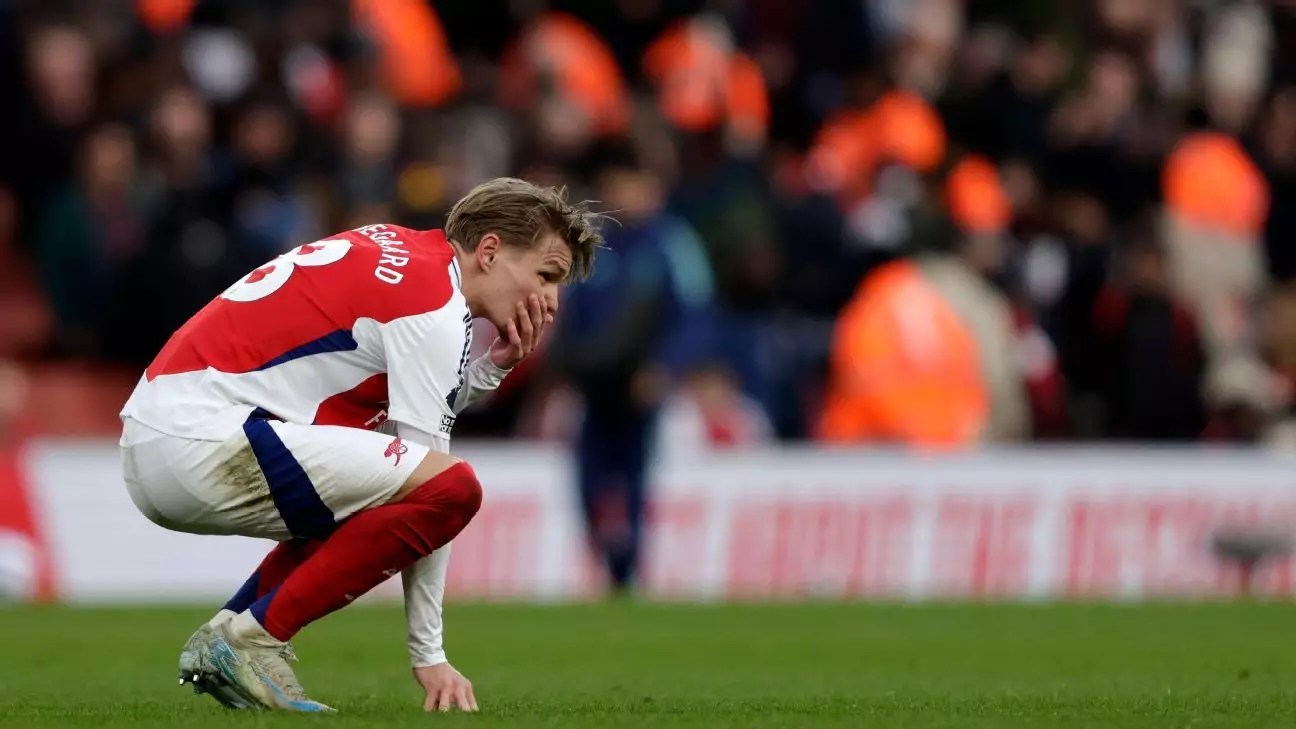In a pulsating encounter at the Emirates Stadium on Saturday, West Ham United inflicted a damaging 1-0 defeat on Arsenal, prompting a wave of questions about the team’s future aspirations in the Premier League. With their latest loss, the Gunners found themselves reflecting on increasingly precarious title hopes, as tactical choices and injury troubles cast a shadow over Mikel Arteta’s vision for winning the league. This analysis examines the multifaceted dimensions of Arsenal’s recent performance, undermined by pivotal decisions at crucial moments.
The match against West Ham United was marred by decisions that highlighted the fragility of Arsenal’s attacking options. With only eight minutes left in the game, West Ham elected to substitute Jarrod Bowen – their match-winner – for Evan Ferguson, a recent loan acquisition from Brighton. To an observer, this move illustrated West Ham’s confidence while simultaneously stressing the lack of depth in Arsenal’s lineup. Mikel Arteta, on the other hand, was left contemplating his choices as his team appeared devoid of a clear tactical direction—raising the question of whether Arsenal missed an opportunity during the January transfer window.
Arteta’s insistence that he had “refused” to attribute the loss to the absence of a recognized striker is perplexing, given the team’s considerably lackluster attacking display. Despite some early enthusiasm, Arsenal’s creativity waned considerably after West Ham adapted to their tactics. This stagnation was not merely a result of West Ham’s tactical prowess but rather a reflection of the limitations within Arsenal’s squad structure. As the Gunners struggled to maintain sustained pressure, the absence of a reliable finisher became conspicuous, echoing the strategic misstep of not bolstering the attacking department during the transfer window.
One must consider whether the Gunners’ failure to pursue a striker like Ollie Watkins more aggressively could ultimately shape their season. Initially, Arsenal’s rejected £40 million bid for Watkins—a player widely regarded as a fierce competitor in the Premier League—seemed like a calculated move. However, in hindsight, it increasingly appears to be a miscalculation that could have profound implications on their title quest, particularly with key players like Kai Havertz, Bukayo Saka, and Gabriel Jesus sidelined for the foreseeable future.
Arteta argues that Arsenal has the quality and standards to compete at the highest level, but consistent failure to convert chances puts immense pressure on a squad that is increasingly looking threadbare in terms of options. Mere statistical analysis reveals that Arsenal managed only two shots on target against West Ham, signifying a troubling trend of inefficiency in front of goal. It begs the question: when did an offensive philosophy that once thrived under Arteta become a caricature of indecision and uncertainty?
Arteta’s frustration was palpable following the defeat, with his post-match comments acknowledging that the players have been unable to achieve the necessary performance levels. Such a dismissal of accountability raises concerns regarding the team’s morale and unity. The alleged re-energizing effect Arteta spoke of before the game proved fleeting, as the players appeared to lack the fire necessary to deliver results in significant fixtures.
The fervor demonstrated by West Ham, buoyed by the resurgence of their attacking game, starkly contrasted with Arsenal’s malaise. The Gunners seemed bereft of belief, a sentiment echoed during moments when the home crowd expressed their disapproval—particularly following a dull free-kick decision that resulted in a backward pass rather than an aggressive challenge. Such moments can fracture team spirit, undermining any intentions of positivity and solidarity.
As Arsenal’s title hopes take a precarious hit, the cumulative effects of their tactical, managerial, and recruitment decisions may ultimately define the trajectory of their season. The remaining fixtures bring impending challenges, with opportunities to regain momentum appearing scarce. Liverpool, their closest competitors, face their own obstacles, yet Arsenal’s current form and game management suggest they are ill-prepared to capitalize on mistakes made by rivals.
In this high-stakes environment, Mikel Arteta must navigate the difficult terrain of expectations and realities. Arsenal’s failure to capitalize on the title race could resonate beyond this season if lessons are not learned in time. Ultimately, the combination of strategic foresight, cohesive teamwork, and the ability to seize game-changing opportunities will determine whether Arsenal can indeed revitalize their championship aspirations or face a deeper reckoning with their ambitions in the years to come.


Leave a Reply